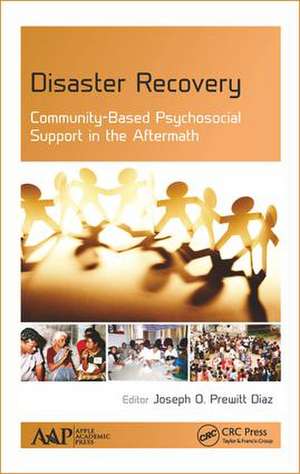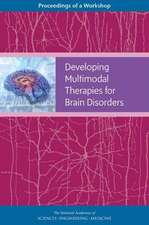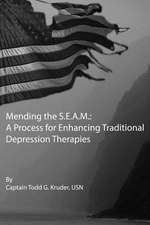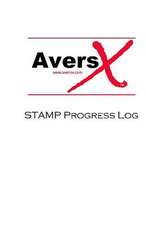Disaster Recovery: Community-Based Psychosocial Support in the Aftermath
Editat de Joseph O. Prewitt Diazen Limba Engleză Hardback – 29 mai 2018
In this volume, the authors share their practical knowledge about development of community-based psychosocial support based on the hundred of thousands of people in fourteen countries and three continents who provided an immense amount of knowledge about psychosocial support through their participation in programs. These programs helped to lead the way in sharing the strategies and tools presented in here.
This book uses case study methodology and practical examples to share how communities can come together, care for themselves, and use their social capital and problem-solving skills to survive and thrive. The information in the book will aid in the development of program offerings for mental health and psychosocial support in disasters and humanitarian emergencies. The final section will provide the components of a proposal for external work and a chapter on monitoring and evaluation. The book will include case studies to help illustrate the content.
Edited by Dr. Joseph O. Prewitt Diaz, a 2008 recipient of the American Psychological Association’s International Humanitarian Award, the book is based on his extensive experience and existing research in the field.
The information provided here will be helpful to those working in or teaching on disaster management and support, including professors and instructors, students in social work and psychology, government and non-government agencies personnel in the field in places where emerging conflicts are occurring, and many others.
| Toate formatele și edițiile | Preț | Express |
|---|---|---|
| Paperback (1) | 587.31 lei 6-8 săpt. | |
| Apple Academic Press Inc. – 31 mar 2021 | 587.31 lei 6-8 săpt. | |
| Hardback (1) | 791.95 lei 6-8 săpt. | |
| Apple Academic Press Inc. – 29 mai 2018 | 791.95 lei 6-8 săpt. |
Preț: 791.95 lei
Preț vechi: 965.79 lei
-18% Nou
Puncte Express: 1188
Preț estimativ în valută:
151.54€ • 158.54$ • 125.88£
151.54€ • 158.54$ • 125.88£
Carte tipărită la comandă
Livrare economică 02-16 aprilie
Preluare comenzi: 021 569.72.76
Specificații
ISBN-13: 9781771886314
ISBN-10: 1771886315
Pagini: 360
Ilustrații: 4 Tables, black and white; 6 Illustrations, color; 19 Illustrations, black and white
Dimensiuni: 152 x 229 x 21 mm
Greutate: 0.73 kg
Ediția:1
Editura: Apple Academic Press Inc.
Colecția Apple Academic Press
ISBN-10: 1771886315
Pagini: 360
Ilustrații: 4 Tables, black and white; 6 Illustrations, color; 19 Illustrations, black and white
Dimensiuni: 152 x 229 x 21 mm
Greutate: 0.73 kg
Ediția:1
Editura: Apple Academic Press Inc.
Colecția Apple Academic Press
Public țintă
Academic and PostgraduateCuprins
Theoretical Building Blocks for Community-Based Psychosocial Support. Historical Overview of Recent Policy Statements, Guidance and Agreements Pertaining to Mental Health and Psychosocial Support. Components of Community-Based Psychosocial Support in Sri Lanka: Planning, Implementing, Monitoring, and Evaluating Community Resilience Project. Psychosocial Support in South and South East Asia: From the Gujarat Earthquake to the Tsunami. Development of a Linguistically Appropriate Instrument in Two States in India. Historical Overview of Psychosocial Support Program Response to the 2004 South Asia Tsunami. CBPSS (Community-Based Psychosocial Support) as Process and Tool for Protection of the Vulnerable Survivors of Disaster. Implementation of Community-Based Psychosocial Support in South Asia. Psychosocial Support as a Priority in Ebola Response: Structured Interventions in Accordance with IASC-MHPSS Guidelines. The First Psychosocial Procedures in Zenie: Ebola Response in Guinea. Safe Schools as a Psychosocial Support Tool for Addressing Threats. Psychosocial Support and Epidemic Control Interface: A Case Study. Psychosocial Support in Communities: A Review of Evidence-Informed Practice.
Notă biografică
Joseph O. Prewitt Díaz, PhD, is a practitioner scholar who has been doing field work and writing about psychosocial support in communities since 1998 in the Caribbean, the Americas, and South Asia, and has designed and implement the a community-based psychological support program in South Asia that served 732,000 people and trained over 22,000 interventors. He has authored or co-authored eight books in Spanish and English on psychosocial support and over 40 referred journal articles. His work was recognized by the American Psychological Association (APA) by being awarded the International Humanitarian Award in 2008 for assisting in the design and preparation of international guidelines and standards, rapid response, training of staff, program management and implementation, and monitoring of psychosocial support on behalf of the American Red Cross (ARC) in South Asia. He served as the ARC Senior Technical Advisor for Psychosocial Support to the 2005. He is currently serving as a Psychosocial Technical Expert with the IFRC Psychosocial Support Reference Center in Copenhagen, Denmark and the IFRC Americas Region integrating psychosocial support into component the Zika epidemic response.
His previous books include Advances in Disaster Mental Health and Psychosocial Support (2007) and Disaster Mental Health in India (2004).
His previous books include Advances in Disaster Mental Health and Psychosocial Support (2007) and Disaster Mental Health in India (2004).
Recenzii
"Dr. Joe Prewitt’s book is a must read for students, practitioners, and academics in the humanitarian and development field. Covering the building blocks and current events, this is by far the most comprehensive book available on the topic of psychosocial support. Within minutes of reading the text, you will realize why it is hard to discuss psychosocial support without discussing the indelible contributions Dr. Joe has made in this area!"
—Jono Anzalone, Vice President, International Services, American Red Cross
"An outstanding and comprehensive contribution to the understanding and practice of international disaster psychology. Not only has he and the other contributors presented a sound framework for the necessity and benefits of community-based approaches, but they’ve also included several case examples to demonstrate how those approaches were implemented constructively in a variety of disaster settings. Of special appreciation from this reviewer’s point of view is the clarity and recognition given to several sociological concepts and related community intervention strategies. The authors’ explanation of the importance of a ‘sense of place’ and ways to restore that following a disaster especially bears noting. Both academics as well as practitioners are encouraged to read this book and develop research and program evaluation designs to focus on one or more of the community sociological intervention concepts and methods identified in this publication."
—Gordon R. Dodge, PhD, LP, Disaster Psychologist
"Disaster Recovery is a landmark text for clinicians and practitioners involved in community-based psychosocial responses in domestic or international emergencies. Based on his many years of disaster experience, Joseph Diaz Prewitt eloquently explains the psychosocial impact of crisis events and emergencies and the need for interdisciplinary psychosocial interventions. He elaborates on the linkages between the territorial and the relational aspects, unfolding the concepts of loss of place and place attachment, and describes the impact of loss of place representing years of lived experiences. The options for a psychosocial transformation and reconstruction, provided communities are mobilized, are described in theory and in chapters on program implementation with case studies from around the world. Disaster Recovery will certainly inform, enlighten and inspire!"
—Ea Suzanne Akasha, Technical Advisor, International Federation of Red Cross and Red Crescent Societies Reference Centre for Psychosocial Support
“This is a unique book on a very important topic of post disaster psychosocial support, which is considered as an important pillar of disaster recovery. . . . This book provides, for the first time, in-depth analysis on the topic, which has both academic analysis as well as practical implications. This book can be considered as a good reference document for future policy formulation as well a research in the subject.”
—Progress in Disaster Science, July 2019, review by Rajib Shaw (Editor-in-Chief)
"This is a unique book on a very important topic of post disaster psychosocial support, which is considered as an important pillar of disaster recovery. . . . This book provides, for the first time, in-depth analysis on the topic, which has both academic analysis as well as practical implications. This book can be considered as a good reference document for future policy formulation as well a research in the subject."
—Progress in Disaster Science, July 2019, review by Rajib Shaw (Editor-in-Chief)
"Dr. Joe Prewitt’s book is a must read for students, practitioners, and academics in the humanitarian and development field. Covering the building blocks and current events, this is by far the most comprehensive book available on the topic of psychosocial support. Within minutes of reading the text, you will realize why it is hard to discuss psychosocial support without discussing the indelible contributions Dr. Joe has made in this area!"
—Jono Anzalone, Vice President, International Services, American Red Cross
"An outstanding and comprehensive contribution to the understanding and practice of international disaster psychology. Not only has he and the other contributors presented a sound framework for the necessity and benefits of community-based approaches, but they’ve also included several case examples to demonstrate how those approaches were implemented constructively in a variety of disaster settings. Of special appreciation from this reviewer’s point of view is the clarity and recognition given to several sociological concepts and related community intervention strategies. The authors’ explanation of the importance of a ‘sense of place’ and ways to restore that following a disaster especially bears noting. Both academics as well as practitioners are encouraged to read this book and develop research and program evaluation designs to focus on one or more of the community sociological intervention concepts and methods identified in this publication."
—Gordon R. Dodge, PhD, LP, Disaster Psychologist
"Disaster Recoveryis a landmark text for clinicians and practitioners involved in community-based psychosocial responses in domestic or international emergencies. Based on his many years of disaster experience, Joseph Diaz Prewitt eloquently explains the psychosocial impact of crisis events and emergencies and the need for interdisciplinary psychosocial interventions. He elaborates on the linkages between the territorial and the relational aspects, unfolding the concepts of loss of place and place attachment, and describes the impact of loss of place representing years of lived experiences. The options for a psychosocial transformation and reconstruction, provided communities are mobilized, are described in theory and in chapters on program implementation with case studies from around the world. Disaster Recovery will certainly inform, enlighten and inspire!"
—Ea Suzanne Akasha, Technical Advisor, International Federation of Red Cross and Red Crescent Societies Reference Centre for Psychosocial Support
—Jono Anzalone, Vice President, International Services, American Red Cross
"An outstanding and comprehensive contribution to the understanding and practice of international disaster psychology. Not only has he and the other contributors presented a sound framework for the necessity and benefits of community-based approaches, but they’ve also included several case examples to demonstrate how those approaches were implemented constructively in a variety of disaster settings. Of special appreciation from this reviewer’s point of view is the clarity and recognition given to several sociological concepts and related community intervention strategies. The authors’ explanation of the importance of a ‘sense of place’ and ways to restore that following a disaster especially bears noting. Both academics as well as practitioners are encouraged to read this book and develop research and program evaluation designs to focus on one or more of the community sociological intervention concepts and methods identified in this publication."
—Gordon R. Dodge, PhD, LP, Disaster Psychologist
"Disaster Recovery is a landmark text for clinicians and practitioners involved in community-based psychosocial responses in domestic or international emergencies. Based on his many years of disaster experience, Joseph Diaz Prewitt eloquently explains the psychosocial impact of crisis events and emergencies and the need for interdisciplinary psychosocial interventions. He elaborates on the linkages between the territorial and the relational aspects, unfolding the concepts of loss of place and place attachment, and describes the impact of loss of place representing years of lived experiences. The options for a psychosocial transformation and reconstruction, provided communities are mobilized, are described in theory and in chapters on program implementation with case studies from around the world. Disaster Recovery will certainly inform, enlighten and inspire!"
—Ea Suzanne Akasha, Technical Advisor, International Federation of Red Cross and Red Crescent Societies Reference Centre for Psychosocial Support
“This is a unique book on a very important topic of post disaster psychosocial support, which is considered as an important pillar of disaster recovery. . . . This book provides, for the first time, in-depth analysis on the topic, which has both academic analysis as well as practical implications. This book can be considered as a good reference document for future policy formulation as well a research in the subject.”
—Progress in Disaster Science, July 2019, review by Rajib Shaw (Editor-in-Chief)
"This is a unique book on a very important topic of post disaster psychosocial support, which is considered as an important pillar of disaster recovery. . . . This book provides, for the first time, in-depth analysis on the topic, which has both academic analysis as well as practical implications. This book can be considered as a good reference document for future policy formulation as well a research in the subject."
—Progress in Disaster Science, July 2019, review by Rajib Shaw (Editor-in-Chief)
"Dr. Joe Prewitt’s book is a must read for students, practitioners, and academics in the humanitarian and development field. Covering the building blocks and current events, this is by far the most comprehensive book available on the topic of psychosocial support. Within minutes of reading the text, you will realize why it is hard to discuss psychosocial support without discussing the indelible contributions Dr. Joe has made in this area!"
—Jono Anzalone, Vice President, International Services, American Red Cross
"An outstanding and comprehensive contribution to the understanding and practice of international disaster psychology. Not only has he and the other contributors presented a sound framework for the necessity and benefits of community-based approaches, but they’ve also included several case examples to demonstrate how those approaches were implemented constructively in a variety of disaster settings. Of special appreciation from this reviewer’s point of view is the clarity and recognition given to several sociological concepts and related community intervention strategies. The authors’ explanation of the importance of a ‘sense of place’ and ways to restore that following a disaster especially bears noting. Both academics as well as practitioners are encouraged to read this book and develop research and program evaluation designs to focus on one or more of the community sociological intervention concepts and methods identified in this publication."
—Gordon R. Dodge, PhD, LP, Disaster Psychologist
"Disaster Recoveryis a landmark text for clinicians and practitioners involved in community-based psychosocial responses in domestic or international emergencies. Based on his many years of disaster experience, Joseph Diaz Prewitt eloquently explains the psychosocial impact of crisis events and emergencies and the need for interdisciplinary psychosocial interventions. He elaborates on the linkages between the territorial and the relational aspects, unfolding the concepts of loss of place and place attachment, and describes the impact of loss of place representing years of lived experiences. The options for a psychosocial transformation and reconstruction, provided communities are mobilized, are described in theory and in chapters on program implementation with case studies from around the world. Disaster Recovery will certainly inform, enlighten and inspire!"
—Ea Suzanne Akasha, Technical Advisor, International Federation of Red Cross and Red Crescent Societies Reference Centre for Psychosocial Support
Descriere
This new volume provides a wealth of realistic and applicable information for addressing mental health related issues resulting from disasters. It provides readers with both a theoretical and practical look at community-based psychosocial support and community consultation from an interdisciplinary perspective. This book uses case study methodology and practical examples to share how communities can come together, care for themselves, and use their social capital and problem-solving skills to survive and thrive. The information in the book will aid in the development of program offerings for mental health and psychosocial support in disasters and humanitarian emergencies.

























